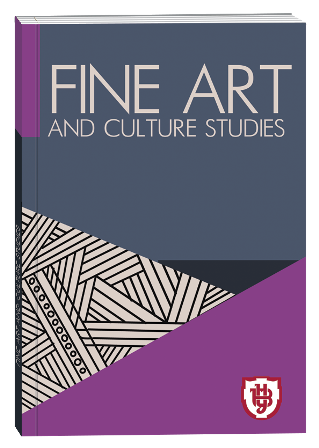CULTURAL TOURISM AS A FACTOR IN COMMUNICATIVE RENEWAL OF PERSONALITY: CULTURAL-ANTHROPOLOGICAL ASPECT
DOI:
https://doi.org/10.32782/facs-2025-4-41Keywords:
cultural tourism, intercultural communication, communicative renewal of personality, existence, cultural anthropology, sociocultural analytics, traveling man (homo viator)Abstract
The purpose of the article is to highlight the cultural and anthropological aspect of tourism as a factor in the existential and communicative renewal of the personality.The research methodology is based on an interdisciplinary strategy of sociocultural analytics, which is based on a synthesis of cultural-anthropological, philosophical-culturological, historical and sociological approaches.The scientific novelty lies in the conceptualization of cultural tourism as a factor in the existential and communicative renewal of modern man through the prism of socio-cultural analytics and a cultural-anthropological approach.Conclusions. It has been proven that cultural tourism can serve as a powerful catalyst for the existential and communicative renewal of the individual, contributing to the expansion of worldview, the development of self- awareness, and the improvement of communication skills. Traveling to new cultural environments stimulates rethinking of one’s own values, beliefs, and goals, and also helps establish connections with other people and cultures. Thus, cultural tourism is not just a vacation, but also a powerful tool for personal growth and development. It allows you not only to enrich your cultural baggage, but also to transform your own life, making it more conscious, rich and meaningful. It is substantiated that an important methodological guideline in such research is a cultural-anthropological approach aimed at analyzing cross-cultural interaction in order to identify and understand more deeply universal patterns of tourist activity and specific features due to ethnocultural differences and the uniqueness of individual human travel experiences.
References
Божко Л. Д. Культурний туризм: від старого змісту до нової концепції. Культура України. Серія: Культурологія. 2016. Вип. 52. С. 90–102.
Бойко В., Далевська Н. Розвиток туризму після збройних конфліктів у різних країнах світу. Управління змінами та інновації. 2022. № 3. С. 5–10.
Вербицька П. Сутність поняття «культурний туризм» у сучасному науковому дискурсі. Historical and Cultural Studies. 2020. Vol. 7, No. 1. C. 12–16.
Глєбова А. О. Інноваційні технології у туристичній галузі. Економіка. Управління. Інновації. 2012. № 2 (8). С. 141–150.
Головей В. Ю. Інтернет-середовище як соціокультурний простір комунікації і творчості. Cultural and artistic practices: world and Ukrainian context [Андрущенко Т.А., Андрущенко В.А., Головей В.Ю. та ін.]. Riga, Latvia : Baltija Publishing, 2023. С. 98–123.
Дичковський С. І. Динаміка культурного потенціалу туристичних практик в контексті індивідуалізації буття сучасної людини. Вісник Національної академії керівних кадрів культури і мистецтв. 2020. № 4. С. 11–20. DOI: https://doi.org/10.32461/2226- 3209.4.2020.219109
Козловський Є. В. Особливості використання технології доповненої реальності у сфері туризму. Культурологічна думка. 2017. № 12. С. 185–190.
Опейда А. Віртуальна подорож як сучасний різновид культурного туризму. Вісник Національної академії керівних кадрів культури і мистецтв : наук. журнал. 2025. № 1. С. 134–139.
Пазенок В. С. Філософія туризму. К. : Кондор, 2004. 268 с.
Пархоменко Т.С. Антропологія туризму. Філософія туризму. Київ : Кондор, 2004. 268 с. URL: http://tourlib.net/books_ukr/filotur (дата звернення: 25.04.2025)
Сіверс В. А., Братусь І. В. Культурологічні аспекти туризму. Вісник національного авіаційного ун-ту. Київ, 2006. № 1 (3). С. 127–135. https://er.nau.edu.ua/server/api/core/bitstreams/8ae7a1e0-dd80-4efb-95ca-a29ababb6a51/content
Холліс Дж. Мандрівка, яку ми звемо своїм життям: питання, які варто прожити. Пер. з англ. Ф. Левчук, Л. Купріна. Ужгород: Exist, ТОВ «РІК-У», 2021. 232 с.
Холліс Дж. Творити життя: знайти власний шлях. Пер. з англ. Л. Купріна; упоряд. С. Вайн. Ужгород: Exist, ТОВ «РІК-У», 2022. 240 с.
Aamir, S., Atsan, N., & Khan, M. S. Going Digital with Multisided-Platforms: Assessing the Innovation Adoption Process from the Perspectives of Travel Agents. Tourism and Hospitality Research. 2023. Retrieved from https://doi.org/10.1177/14673584231186535
ICOMOS, International Tourism Charter. 2002. Retrieved from https://www.icomos.no/wp-content/uploads/2014/04/ICTC-Charter.pdf
Maitland, R. Cultural tourism and the development of new tourism areas in London In Richards, G. (Ed.) Cultural Tourism: Global and local perspectives. New York: Haworth Hospitality Press. 2007.
Rehan Iftikhar, Mohammad Saud Khan & Khamsavay Pasanchay. Virtual reality tourism and technology acceptance: a disability perspective. Leisure Studies, 2023. 849–865. Retrieved from https://doi.org/10.1080/02614367.2022.2153903
Richards, G. Cultural Tourism in Europe. Wallingford: CABI. 1996. P. 166-200.
Thomas, G. Challenges and Trends of Digital Innovation in the Tourism Sector: Contemporary Literature Review. Open Journal of Business and Management. 2024. 12, 179–190. Doi: 10.4236/ojbm.2024.121013
Timothy, Dallen J. Cultural Heritage and Tourism: An Introduction. Bristol, Blue Ridge Summit: Channel View Publications, 2020. https://doi.org/10.21832/9781845417727
Why we post: a global anthropological research project on the uses and consequences of social media. URL: https://www.ucl.ac.uk/social-historical-sciences/anthropology/research/why-we-post








